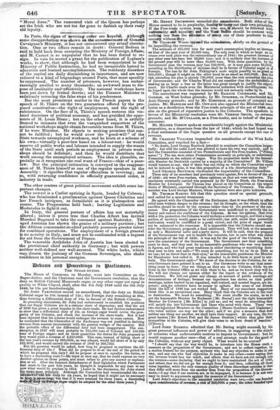In Paris, the signs of reviving order are hopeful. Although
some disapprobation' was shown on the announcement of General Cavaignac's Ministry, it has not encountered any actual obstruction. One or two offices remain in doubt : General Bedeau is said to hold back from accepting the Ministry of Foreign Affairs; and M. Carnot is so unpopular that he has been forced to resign. In vain he moved a grant for the publication of Laplace's works, to show, that although he had been reappointed to the Ministry of Public Instruction, he had no insuperable hatred to education and learned accomplishments. The residuary disorders of the capital are daily diminishing in importance, and are now reduced to a kind of brigandage around Paris, that must speedily be suppressed. The number of prisoners, however, has embarrassingly swelled to many thousands; an awkward mass to dispose of creditably and'effectively. The national workshops have been put down by formal decree ; and the Finance Minister is sedulously retracing the false steps of his predecessor.
But the most prominent matter in the French papers is the speech of M. Thiers on the two guarantees offered by the proposed constitution—the right of employment, and the right of subsistence. On the face of it, Thiers's speech restores the violated doctrines of political economy, and has gratified the opponents of M. Louis Blanc ; but on the other hand, it is artfully framed to intimate that even the vanquished supporters of the national workshops might obtain favourable terms from M. Tillers, if he were Minister. He objects to making promises that cannot be fulfilled ; but he would avow the " good-will " of the State towards unemployed workmen, and he hints at a scheme of his own—virtually a poor-law based on a labour-test : he would reserve all public works and labours intended to supply the wants of the State until such periods as employment in private workshops should be deficient ; and then he would distribute that work among the unemployed artisans. The idea is plausible, especially as it recognizes one real want of France—that of a poorlaw. But the principal intimation is conveyed in the reappearance of M. niers himself as one of the regular speakers in the Assembly : it signifies that regular officialism is reviving ; and Bo, with returning confidence in officially guaranteed order, is industry in trade.


























 Previous page
Previous page